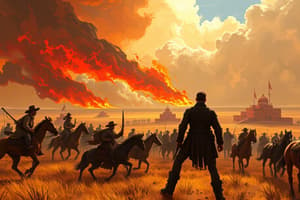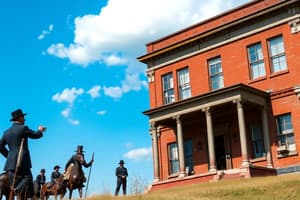Podcast
Questions and Answers
What was the cause of Bleeding Kansas?
What was the cause of Bleeding Kansas?
- Dispute over land ownership
- Conflict over economic policies
- Growing contention regarding slavery amplified by westward expansion (correct)
- Tensions between Native American tribes and settlers
What characterized the violence in Bleeding Kansas?
What characterized the violence in Bleeding Kansas?
- Sectarian violence between pro-slavery and anti-slavery advocates (correct)
- Tensions between different political parties
- Conflict between Native American tribes and settlers
- Struggle for independence from the United States
What did Bleeding Kansas reflect?
What did Bleeding Kansas reflect?
- Economic disparities between Northern and Southern states
- Political struggles for power in the Midwest
- Religious conflicts in the newly forming state of Kansas
- Growing tensions regarding slavery in the United States (correct)
How did Southern politics contribute to the conflict in Bleeding Kansas?
How did Southern politics contribute to the conflict in Bleeding Kansas?
What did many scholars consider Bleeding Kansas to be?
What did many scholars consider Bleeding Kansas to be?
What event is considered a prelude to the U.S. Civil War?
What event is considered a prelude to the U.S. Civil War?
What was the intention behind the assault on Harper's Ferry by John Brown and his followers?
What was the intention behind the assault on Harper's Ferry by John Brown and his followers?
What was the impact of the election of Abraham Lincoln to the presidency in November 1860?
What was the impact of the election of Abraham Lincoln to the presidency in November 1860?
What was the process for the admittance of new states at the time?
What was the process for the admittance of new states at the time?
What event further drove a wedge between the North and South, with ties formally severed just a few months later?
What event further drove a wedge between the North and South, with ties formally severed just a few months later?
What was the impact of the Missouri Compromise of 1820 on the issue of slavery expansion?
What was the impact of the Missouri Compromise of 1820 on the issue of slavery expansion?
What was the key feature of the Compromise of 1850 regarding the issue of slavery?
What was the key feature of the Compromise of 1850 regarding the issue of slavery?
What was the effect of the Kansas-Nebraska Act of 1854 on the organization of the remaining Louisiana Purchase territory?
What was the effect of the Kansas-Nebraska Act of 1854 on the organization of the remaining Louisiana Purchase territory?
What characterized the violence in Kansas in November 1855?
What characterized the violence in Kansas in November 1855?
What was the outcome of the conflict in Kansas?
What was the outcome of the conflict in Kansas?
Flashcards are hidden until you start studying
Study Notes
Bleeding Kansas and the Expansion of Slavery
- Political anxiety surrounded slavery during the addition of new states, as each state would impact the closely divided Congress.
- The Missouri Compromise of 1820 admitted Maine as a free state, Missouri as a slave state, and banned further slavery expansion above the 36-30 parallel.
- The Compromise of 1850 allowed New Mexico and Utah territories to decide the issue of slavery through popular sovereignty.
- The Kansas-Nebraska Act of 1854 organized the remaining Louisiana Purchase territory and allowed new states to decide on slavery.
- Kansas became the flashpoint of the larger slavery debate, with settlers from both North and South attempting to influence the territory's stance on slavery.
- Violence erupted in Kansas in November 1855, with clashes between opposing militias and escalating tensions.
- In 1856, the Kansas territory saw sectarian violence, with attacks from both pro-slavery advocates and Free-Staters.
- The infamous "Border Ruffians" raided the lands of anti-slavery settlers, leading to the sacking of Lawrence, Kansas.
- The violence culminated in the Battle of Osawatomie and was marked by reprisal attacks and organized militias fighting for three months.
- The conflict in Kansas ended with a fragile peace brokered by the new territorial governor, John Geary.
- Bleeding Kansas became the focus of the larger slavery conflict in the U.S., with violence also erupting in the halls of Congress.
- The events in Kansas served as red flags heralding the greater conflict that would lead to the U.S. Civil War.
Studying That Suits You
Use AI to generate personalized quizzes and flashcards to suit your learning preferences.




